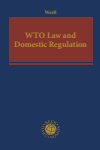WTO Law and Domestic Regulation
Exploring the Determinants for the Impact of the WTO on Domestic Regulatory Autonomy
Abstract
Weiß
WTO Law and Domestic Regulation
The book explores the impact of WTO law on domestic regulatory autonomy. It identifies and critically analyses the mechanisms working in WTO law that cause increasing interferences with domestic law and thus restrain the regulatory autonomy of the WTO members. The book proposes ways how WTO law be conceptualized to enhance the policy space of WTO members. Therefore, the book demonstrates the flexibilities in interpreting and applying WTO core principles and provisions and explores interpretive and institutional conceptions that could serve as a pathway of allocating greater policy leeway to WTO members. The analyses presented address the disturbing observation that even though WTO law appreciates the regulatory leeway of WTO members in several provisions across agreements, the WTO judiciary´s case law, but also other governance mechanism active in the WTO appear to narrow down the WTO members´ regulatory autonomy and to considerably limit the space for domestic policy choices. Wide spread, even scholarly perception of the WTO, and most recently the Trump administration blame the WTO, in particular its dispute settlement branch, for being biased towards free trade and unduly restraining even legitimate domestic policies, and voiding the domestic policy space needed for addressing societal concerns and global problems. A closer look at the development of GATT/WTO law, however, reveals that, in GATT era, panels were aware of the effect their interpretations had on domestic policy space, and that some of the more recent WTO dispute settlement reports show attempts to expand WTO member´s leeway again. These observations are the starting point for an in-depth analysis of the different mechanisms present in WTO law which impact on domestic regulation.
Zusammenfassung
Weiß
WTO Law and Domestic Regulation
The book explores the impact of WTO law on domestic regulatory autonomy. It identifies and critically analyses the mechanisms working in WTO law that cause increasing interferences with domestic law and thus restrain the regulatory autonomy of the WTO members. The book proposes ways how WTO law be conceptualized to enhance the policy space of WTO members. Therefore, the book demonstrates the flexibilities in interpreting and applying WTO core principles and provisions and explores interpretive and institutional conceptions that could serve as a pathway of allocating greater policy leeway to WTO members. The analyses presented address the disturbing observation that even though WTO law appreciates the regulatory leeway of WTO members in several provisions across agreements, the WTO judiciary´s case law, but also other governance mechanism active in the WTO appear to narrow down the WTO members´ regulatory autonomy and to considerably limit the space for domestic policy choices. Wide spread, even scholarly perception of the WTO, and most recently the Trump administration blame the WTO, in particular its dispute settlement branch, for being biased towards free trade and unduly restraining even legitimate domestic policies, and voiding the domestic policy space needed for addressing societal concerns and global problems. A closer look at the development of GATT/WTO law, however, reveals that, in GATT era, panels were aware of the effect their interpretations had on domestic policy space, and that some of the more recent WTO dispute settlement reports show attempts to expand WTO member´s leeway again. These observations are the starting point for an in-depth analysis of the different mechanisms present in WTO law which impact on domestic regulation.
- 1–17 Introduction 1–17
- 46–49 E. Conclusion 46–49
- 79–81 A. Introduction 79–81
- 206–229 D. Market Access Rules 206–229
- 371–377 H. Conclusion 371–377
- 377–379 A. Introduction 377–379
- 395–410 C. Burden of Proof 395–410
- 423–442 Bibliography 423–442

